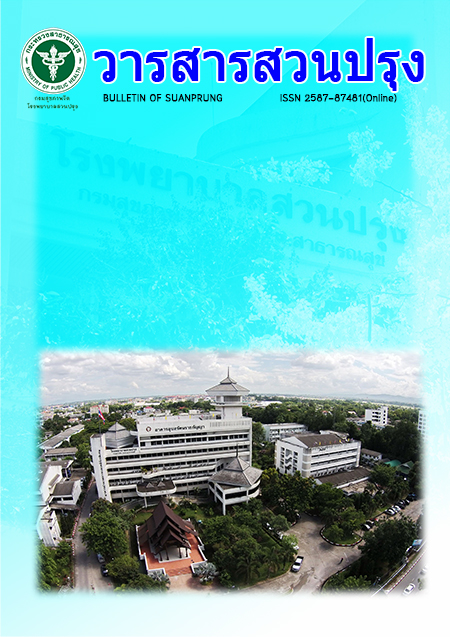The Relationship between Sleep Habits and Behavioral Problems in Children with Autism Spectrum Disorder at Maharaj Nakorn Chiang Mai Hospital
Main Article Content
Abstract
Abstract
Objective: This study aimed to examine the relationship between sleep
habits and behavioral problems inchildren with autistic spectrum disorder (ASD).
Methods:Fifty participants were selected from children who were diagnosed
with DSM-5 ASD by psychiatrists. They were aged 4-10 years and received
treatment at the psychiatric department of Maharaj Nakorn Chiang Mai Hospital
between June and November 2016. Caretakers rated sleep and behavioral
problems by using the Child Sleep Habits Questionnaire, Thai version (CSHQ-Thai)
and the Aberrant Behavior Checklist, Thai version (ABC-Thai). Factors associated
with behavioral problems were determined by using multiple linear regression.
Results: Of 50 children with ASD, 74% were male, 76% had school education
and 56% were on medication. The mean total scores of CSHQ-Thai and ABC-Thai
were 47.84 (SD=7.77) and 61.68 (SD=33.97), respectively. Over sleep habits and
behavioral problems were significantly correlated. Particular problems of sleep were
significantly correlated with particular behavioral problems. For example, sleepdisordered
breathing had a significant correlation with irritability, lethargy,
hyperactivity/noncompliance, and inappropriate speech.
Conclusions: Sleep problems are common in children with ASD. Assessing
some specific sleep habits, for example, sleep-disordered breathing, are important in
taking care of children with ASD.
Key words: Sleep, Behavioral problem, Autism, Autistic spectrum disorder.
บทคัดย่อ
วัตถุประสงค์ศกึษาความสมัพนัธ์ระหว่างกจิวตัรการนอนกบั ปญั หาพฤตกิรรมท่ี
เกดิขน้ึในผปู้ว่ ยโรคออทสิซมึ
วิธีการ คดัเลอืกผปู้ว่ ยเดก็ออทสิซมึทไ่ีด้รบั การวนิิจฉัยตาม DSM-5 โดยจิตแพทย์
ที่มีอายุ4-10 ปีที่รักษาในโรงพยาบาลมหาราชนครเชียงใหม่ ตั้งแต่ มิ.ย.- พ.ย. พ.ศ. 2559
จ านวน 50 คน และให้ผู้ดูแลเด็กประเมินแบบประเมินกิจวัตรการนอนฉบับภาษาไทย
Child Sleep Habits Questionnaire (CSHQ-Thai version) และแบบประเมนิ ปญั หา
พฤติกรรมฉบับภาษาไทย Aberrant Behavior Checklist (ABC-Thai version)
หาความสัมพันธ์ของสองตัวแปรโดยใช้การวิเคราะห์ถดถอยเชิงเส้นพหุ (multiple linear
regression analysis)
ผลการศึกษา กลุ่มตัวอย่างส่วนใหญ่เป็นเพศชายร้อยละ 74 เข้าเรียนในระบบ
การศึกษาร้อยละ 76 ใช้ยาในการรักษาร้อยละ 56 พบว่ามีคะแนนรวม CSHQ เฉลี่ย 47.84
(SD=7.77) คะแนนรวม CSHQ ที่มากกว่า 41 คะแนนคิดเป็นร้อยละ 84 และคะแนนรวม
ABC เฉลี่ย 61.68 (SD=33.97) กิจวตัรการนอนท่ีมีปญั หาและปญั หาพฤติกรรมมี
ความสัมพันธ์กันอย่างมีนัยส าคัญทางสถิติ โดยรูปแบบการนอนบางรูปแบบมีความสัมพันธ์
เชิงบวกกบั ปญั หาพฤติกรรม เช่น ปญั หาการนอนท่ีเก่ียวข้องกบั การหายใจ (sleepdisordered
breathing) มีความสมั พันธ์เชิงบวกกับปญั หาอารมณ์หงุดหงิดฉุนเฉียว
(irritability) ความเฉื่ อยชา (lethargy) การซุกซนไม่อยู่นิ่ง/ไม่ให้ความร่วมมือ
(hyperactivity/noncompliance) และการพูดที่ไม่เหมาะสม (inappropriate speech) ได้
สรุป ปญั หาการนอนเป็นปญั หาท่พี บได้บ่อยในเดก็ออทสิซมึ การประเมนิ ปญั หา
การนอนดา้นต่างๆ เช่น ปญั หาการนอนทเ่ีกย่ีวขอ้งกบัการหายใจ มคีวามสา คญั ในการดแูล
และรักษาเด็กออทิสซึม
ค าส าคัญ: การนอน, ปญั หาพฤตกิรรม, ออทิสซึม
Article Details
บทความหลังผ่านการปรับแก้จากกองบรรณาธิการแล้ว เป็นลิขสิทธ์ของวารสารจิตเวชวิทยาสาร โรงพยาบาลสวนปรุง กรมสุขภาพจิต กระทรวงสาธารณสุข ห้ามเผยแพร่เพื่อประโยชน์ทางการค้าโดยไม่ได้รับอนุญาต แต่อนุญาตให้เผยแพร่บทความดังกล่าวเพื่อประโยชน์ทางการศึกษาแก่ประชาชนทั่วไป ทั้งนี้กองบรรณาธิการไม่จำเป็นต้องเห็นด้วยกับบทความหรือข้อคิดเห็นใดๆ ที่ปรากฏในวารสารสวนปรุง

